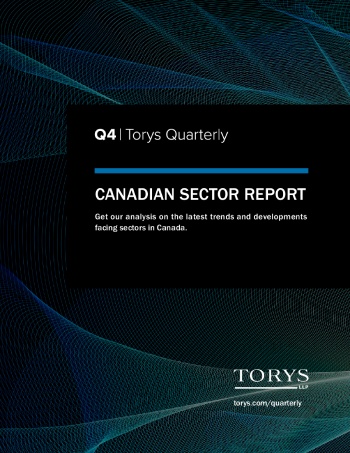In this issue of the Torys Quarterly, we turn our focus to sectors in Canada: what kind of deal activity are they experiencing, what marketplace and regulatory challenges are they facing—and what does it mean for Canadian business as we move toward 2020?
Some of Canada’s emerging and fast-growing sectors have been busy managing new realities as they continue to develop. Canada’s technology sector is maturing, with acqui-hires and other investment coming into the country’s tech hubs. Canada’s tech sector has become a particularly attractive sector for U.S. buyers—including large buyers—which is influencing the Canadian tech ecosystem in important ways, from how deals are getting done to domestic VC funding.
Canada’s financial institutions are experiencing points of transition, including in response to new regulation and increased scrutiny and enforcement. Operationally, the sector is working to keep up with consumer demand for fintech, and FIs are looking to make use of cloud-based solutions and digital innovation, while navigating compliance risks associated with fintech and new consumer protection legislation.
Headlines in Canada throughout 2019 have been dominated by developments in the oil and gas sector. In Canada’s oilsands, legal, regulatory and political woes continue to add strain to the sector. Those in the still-evolving North American cannabis sector also face headwinds with tightening financing conditions amid ongoing regulatory developments that have significant implications for the future of the market.
Other Canadian sectors are addressing investment challenges. Mining participants are seeking creative financing alternatives in the face of constrained investment from institutional and generalist investors. The power sector is working to balance ratepayers’ prices with the need to source greater investment in aging infrastructure assets. And in light of the federal government’s mandate to ensure universal access to broadband internet in Canada, project proponents in the public and private sectors are contemplating creative project models to fulfil this objective. Meanwhile a new environmental impact assessment regime for large projects has been introduced, which will influence how project proponents pursue new opportunities across the country.
The real estate sector is seeing shifts in both investor type and investment strategy. Private equity and other institutional investors looking for stable returns are increasing their investments in real estate. Urban intensification outside of the traditional office and multi-family asset classes is being extended to also include seniors housing. And transit-oriented development—where developers are paying to develop public infrastructure as part of urban intensification—is influencing the industry.
Read more on these sector trends and developments in the Q4 Torys Quarterly.
Subscribe and stay informed
Stay in the know. Get the latest commentary, updates and insights for business from Torys.
Stay in the know. Get the latest commentary, updates and insights for business from Torys.
Subscribe Now
